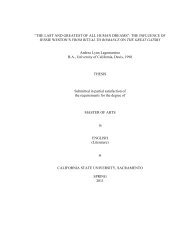national register nomination for boulevard park historic
national register nomination for boulevard park historic
national register nomination for boulevard park historic
Create successful ePaper yourself
Turn your PDF publications into a flip-book with our unique Google optimized e-Paper software.
the squares included in the Sutter grant to the inhabitants of the city of Sacramento <strong>for</strong> public use as the city<br />
authorities should determine.<br />
It seems that long ago Fannie K. Cross gave a quitclaim deed to the square to Frank Malone and<br />
the Union Park Association. Beyond that no trace of claim of title in anyne is found. The Park Realty<br />
Company is having the matter looked into, and has not divided the squares, and will not until its right to do<br />
so is clearly established.<br />
Many citizens hold that the title resides in the city, and that the long adverse possession has not<br />
divested it of title, while others hold that it has parted with title in permitting its use <strong>for</strong> <strong>park</strong> purposes by<br />
the State Agricultural Society and its predecessors.”<br />
The square was never subdivided, and was in fact returned to the City of Sacramento’s ownership. This loss<br />
of developable land may have resulted in another change to the original Boulevard Park plan: a fourth<br />
“alley <strong>park</strong>” planned <strong>for</strong> the center of F, G, 20th and 21st Street was never built.<br />
Codes, Covenants & Restrictions (CC&Rs) in Boulevard Park<br />
Purchasers on the southern edge of Boulevard Park were required to sign a deed that included permanent<br />
restrictions on the property. Buyers of the small lots on the northern end did not include all CC&R<br />
requirements, but followed similar rules regarding building setbacks and front fences. Not all of these rules<br />
were strictly obeyed throughout the district’s period of significance, but they limited incompatible<br />
development sufficiently to create a visually and aesthetically coherent neighborhood. The covenants in<br />
place in Boulevard Park did not include racial covenants.<br />
A copy of the CC&R document is included in the deed <strong>for</strong> 2115 G Street:<br />
1. (unreadable) to be used exclusively <strong>for</strong> residence purposes;<br />
2. only one house shall be erected on (unreadable) which house shall be two-story erected of new<br />
material, and shall cost not less than twenty-five Hundred ($2,500.00) Dollars; no old building shall be<br />
removed to or placed upon said lot.<br />
3. No flats or double houses shall be erected on said lit;<br />
4. The front of the house (exclusive of the porch and steps) shall not be closer than Twenty-five (25)<br />
feet to the sidewalk line of the sidewalk running along the front of said property, and the porch and steps<br />
not closer than eleven (11) feet to sail sidewalk line; and the house must not be built nearer than Three (3)<br />
feet to the adjoining lots on either side.<br />
5. No front fences shall be erected and no fence on said lot shall be constructed nearer to said<br />
sidewalk than will be the house which shall be erected thereon.<br />
6. No barns shall be constructed on said lot without the written consent of all other owners of lots in<br />
the block in which said lot is situated.<br />
The Developers<br />
Clinton L. White, President, Park Realty<br />
Clinton L. White was born in Springville, Iowa in 1850, and moved to Cali<strong>for</strong>nia in 1874 after graduating<br />
from Cornell College. He moved to Sacramento after eight months in Placer County, and worked <strong>for</strong><br />
Sacramento attorney George Cadwalader be<strong>for</strong>e receiving his own law license in 1877. From 1881-1882 he<br />
was a Deputy Attorney General of the State of Cali<strong>for</strong>nia. In 1892 he became a member of the Board of<br />
Freeholders who crafted a new charter <strong>for</strong> the city of Sacramento, adopted in 1893. He served as Mayor of<br />
Sacramento from 1908 to 1909, was a delegate to the Republican National Convention in Chicago, and in<br />
1916 he was a delegate to the Progressive National Convention. In addition to his legal practice and<br />
political career, White was a board member of the People’s Bank and had agricultural real estate holdings<br />
in the northern Sacramento Valley. White died in 1925.<br />
141



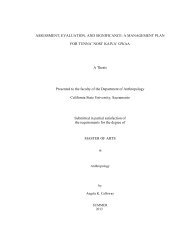
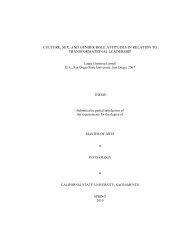
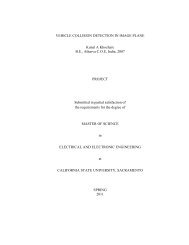
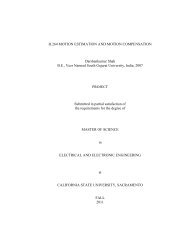
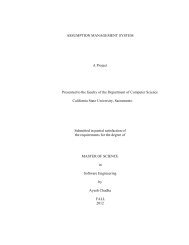
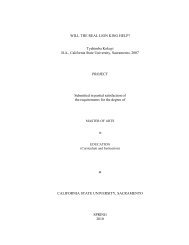
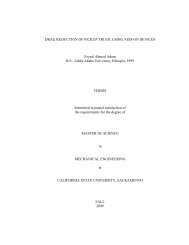
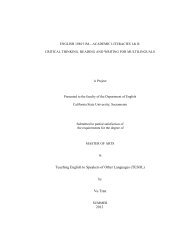
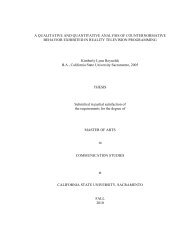
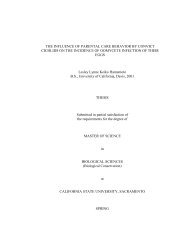
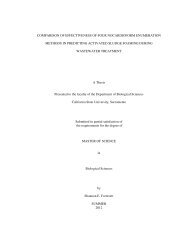
![Completed Thesis to Grad Studies[Final3].pdf](https://img.yumpu.com/17538645/1/190x245/completed-thesis-to-grad-studiesfinal3pdf.jpg?quality=85)
